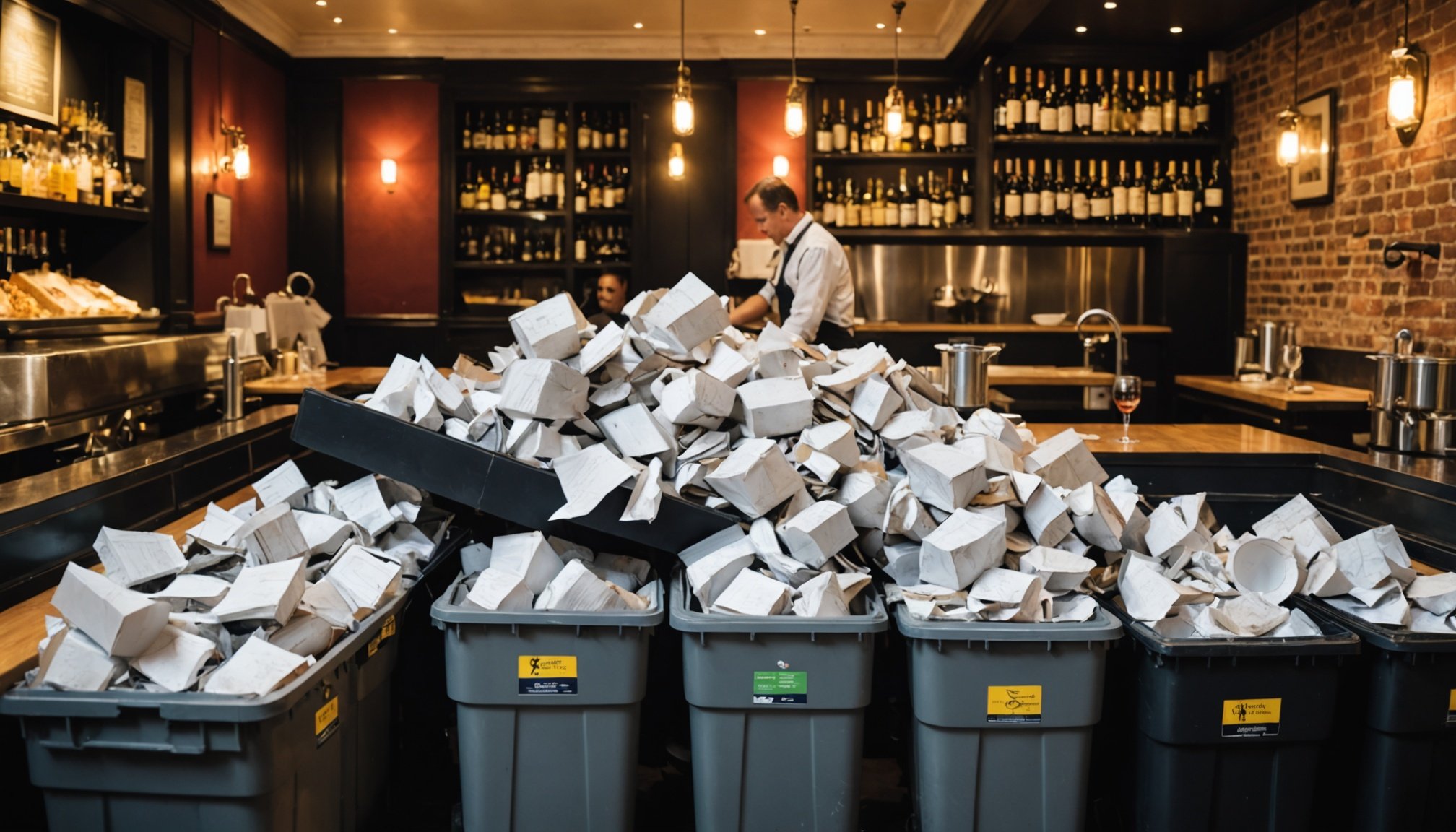Effective waste disposal is more than just an operational necessity for London restaurants; it’s a legal obligation. Compliance with local regulations not only safeguards the environment but also protects your business from costly penalties. This comprehensive overview will break down essential legal guidelines, ensuring that your restaurant manages waste responsibly and sustainably. Equip yourself with the necessary knowledge to streamline waste processes and contribute positively to your community. Understanding these regulations fosters good practices that benefit both your establishment and the environment.
Overview of Waste Disposal Regulations in London
Understanding waste disposal regulations is crucial for restaurants in London. Compliance ensures not only legal adherence but also contributes to environmental sustainability.
Additional reading : Essential Emergency Response Training for Bar Staff: Equip Your Team to Handle Crisis Situations Effectively
Legal Compliance for Restaurants
For restaurants, staying compliant with waste disposal regulations is a legal obligation. Non-compliance can lead to severe penalties. Key legislation includes the Environmental Protection Act 1990, which mandates proper waste management to prevent harm to health or the environment.
Key Legislation
The Environmental Protection Act is just one piece of the puzzle. Restaurants must also consider the Waste (England and Wales) Regulations 2011, which require businesses to apply the waste hierarchy: reduce, reuse, recycle. Compliance with these rules is not optional; it's a necessity for operating legally in London.
Additional reading : Essential Tips for Creating an Engaging Live Cooking Station in Your Buffet Restaurant
Role of Local Authorities
Local authorities play a pivotal role in enforcing waste disposal regulations. They conduct inspections and provide guidance to ensure restaurants adhere to the standards. Their involvement helps maintain public health and environmental quality.
- Key Points:
- Regular inspections by local authorities
- Guidance on proper waste management
- Enforcement of penalties for non-compliance
By understanding and adhering to these waste disposal regulations, restaurants can operate smoothly while contributing to a cleaner London.
Key Legislation Impacting Waste Disposal
Understanding the intricacies of waste disposal legislation is essential for the hospitality sector.
Environmental Protection Act 1990
The Environmental Protection Act 1990 is fundamental, mandating that businesses manage waste responsibly to protect health and the environment. It sets the groundwork for all waste management practices, ensuring that waste is stored, transported, and disposed of without causing harm.
Waste (England and Wales) Regulations 2011
The Waste (England and Wales) Regulations 2011 build on this by introducing the waste hierarchy: reduce, reuse, recycle. These regulations require businesses to prioritize waste reduction, then reuse materials before recycling. This approach not only minimizes environmental impact but also encourages sustainable practices within the hospitality sector.
Other Relevant Legislation
Apart from these, other legislation impacts waste disposal, such as the Duty of Care regulations, which obligate businesses to ensure waste is managed by authorized carriers. This comprehensive legal framework is crucial for maintaining compliance and promoting sustainability.
- Key Legislation:
- Environmental Protection Act 1990
- Waste (England and Wales) Regulations 2011
- Duty of Care regulations
By adhering to these laws, businesses in the hospitality sector can effectively manage waste, fulfilling both legal and environmental responsibilities.
Waste Segregation Guidelines for Restaurants
Effective waste management is crucial for legal compliance and environmental sustainability.
Importance of Waste Segregation
Waste segregation is essential in restaurants to ensure compliance with waste disposal regulations. It involves sorting waste into categories such as general, recyclable, and hazardous. By doing so, restaurants not only adhere to legal requirements but also promote recycling and reduce landfill contributions.
Categories of Waste
Restaurants must distinguish between different waste categories:
- General Waste: Includes non-recyclable materials like food scraps.
- Recyclable Waste: Encompasses items like glass, paper, and plastics.
- Hazardous Waste: Involves substances like cleaning chemicals.
Proper segregation ensures that each type of waste is disposed of correctly, minimizing environmental impact.
Best Practices for Waste Sorting
Implementing best practices for waste sorting can significantly enhance a restaurant's compliance and sustainability efforts.
- Label bins clearly to avoid confusion.
- Train staff regularly on waste segregation procedures.
- Monitor waste output to identify areas for improvement.
A well-organized waste management system not only meets recycling guidelines but also fosters a culture of environmental responsibility within the restaurant.
By adopting these practices, restaurants can efficiently manage waste, ensuring compliance and contributing positively to the environment.
Approved Waste Disposal Methods
Effective waste management ensures compliance and environmental responsibility.
Overview of Approved Methods
Restaurants must utilize approved waste disposal methods to comply with regulations and maintain environmental standards. Selecting the right methods is crucial for effective restaurant waste management. These methods include recycling, composting, and using waste-to-energy facilities. Each method aligns with legal compliance, ensuring that waste is handled in an environmentally friendly manner.
Importance of Selecting Licensed Waste Carriers
Choosing licensed waste carriers is vital for legal compliance in waste disposal. Licensed carriers are authorized to handle and transport waste, ensuring that it is disposed of responsibly. This selection not only fulfills the legal obligations but also reduces the risk of improper waste management. Restaurants should verify the credentials of carriers to ensure they meet regulatory standards.
- Key Considerations:
- Verify carrier licenses
- Regularly review carrier performance
- Ensure compliance with regulations
Methods for Hazardous Waste Disposal
Disposal of hazardous waste requires specialized methods to prevent environmental harm. Restaurants must adhere to strict guidelines for disposing of items like cleaning chemicals. Approved methods include using specialized containers and contracting licensed hazardous waste carriers. Proper disposal protects public health and aligns with legal compliance, safeguarding both the environment and the restaurant's reputation.
Compliance Requirements for Restaurants
Compliance with waste management regulations is essential for restaurants to operate legally and sustainably.
Documentation and Record-Keeping
Restaurants must maintain meticulous documentation and record-keeping to meet compliance requirements. This includes detailed records of waste disposal activities, such as dates, types of waste, and methods used. Proper documentation helps demonstrate adherence to legal obligations and facilitates audits by local authorities.
- Essential Records:
- Waste disposal logs
- Carrier licenses
- Waste management plans
Regular Training and Staff Responsibilities
Regular training for staff is crucial in ensuring compliance with restaurant waste management protocols. Employees should be well-versed in waste segregation, handling procedures, and emergency protocols. Assigning clear responsibilities ensures everyone understands their role in maintaining compliance.
Importance of Maintaining Up-to-Date Waste Management Plans
An up-to-date waste management plan is a cornerstone of compliance. These plans should outline processes for waste segregation, disposal methods, and emergency procedures. Regular reviews and updates ensure that the plan remains aligned with the latest regulations and best practices.
By focusing on these compliance requirements, restaurants can effectively manage waste, uphold their legal obligations, and contribute to environmental sustainability. Maintaining thorough records, providing continuous staff training, and updating waste management plans are critical steps in this process.
Penalties for Non-Compliance
Understanding the consequences of neglecting waste disposal regulations is crucial for restaurant owners.
Overview of Potential Penalties and Fines
Non-compliance with waste disposal regulations can lead to significant penalties. Restaurants may face fines ranging from thousands to tens of thousands of pounds. These penalties are designed to enforce adherence to environmental laws and discourage negligence. In severe cases, legal actions can culminate in business closures or license revocations.
Case Studies of Non-Compliance in the Restaurant Sector
Several instances highlight the repercussions of waste disposal violations. For example, a well-known London restaurant faced a hefty fine after improper waste management practices were discovered. This case underscores the importance of compliance and the potential financial burden of legal consequences.
Long-Term Impacts of Legal Violations
The long-term impacts of legal violations extend beyond immediate financial penalties. Repeated non-compliance can damage a restaurant's reputation, affecting customer trust and business viability. Moreover, ongoing legal issues can divert resources and attention away from core business operations.
- Key Takeaways:
- Financial penalties can be substantial
- Legal violations harm reputation
- Compliance is essential for sustainable operations
By understanding these potential penalties, restaurant owners can better appreciate the importance of adhering to waste disposal regulations.
Best Practices for Waste Management in Restaurants
Effective waste management is a cornerstone of restaurant sustainability.
Strategies for Reducing Waste Generation
Implementing strategies for reducing waste generation is essential for enhancing restaurant sustainability. Restaurants can start by conducting regular waste audits to identify key areas for improvement. Menu planning is another effective strategy; by designing dishes that use ingredients efficiently, waste can be minimized. Additionally, adopting portion control helps in reducing food waste significantly.
Implementing a Successful Recycling Program
A comprehensive recycling program is vital for effective waste management. Restaurants should provide clearly labeled recycling bins and ensure staff are trained in proper sorting techniques. Regularly reviewing recycling practices can lead to improvements and enhanced sustainability outcomes. A successful program not only reduces waste but also supports environmental goals.
Engaging Staff and Customers in Waste Reduction Efforts
Engaging both staff and customers in waste reduction efforts is crucial. Staff training sessions can emphasize the importance of waste management strategies and sustainability. Encouraging customers to participate, perhaps through incentives for bringing reusable containers, can further reduce waste. By fostering a culture of sustainability, restaurants can achieve long-term success in their waste reduction goals.
- Key Actions:
- Conduct waste audits
- Train staff in recycling
- Encourage customer participation
By adopting these best practices, restaurants can improve their sustainability efforts and effectively manage waste.
Practical Examples and Case Studies
Exploring effective strategies and lessons in restaurant waste management.
Successful Waste Management Strategies
Leading restaurants have embraced innovative practices in waste reduction. For instance, a renowned London eatery achieved a 50% waste reduction by implementing a comprehensive recycling program and engaging staff in sustainability efforts. By conducting regular waste audits and optimizing their menu planning, they minimized food waste, demonstrating the potential of strategic waste management.
Lessons Learned from Compliance Failures
Compliance failures offer valuable insights. A notable case involved a restaurant facing significant fines due to improper waste segregation. This highlighted the importance of adhering to waste disposal regulations and maintaining meticulous documentation. Such case studies underscore the necessity of regular staff training and clear waste management policies to avoid legal repercussions.
Innovative Practices in Waste Reduction
Restaurants are adopting innovative practices to tackle waste. A popular chain introduced composting initiatives, turning food scraps into valuable compost for local farms. This practice not only reduces landfill contributions but also supports local agriculture, showcasing a sustainable model for others to follow.
- Key Innovations:
- Comprehensive recycling programs
- Composting initiatives
- Staff engagement in sustainability
By examining these practical examples, restaurants can learn from both successes and failures, refining their waste management strategies for better compliance and sustainability.
Resources and Further Assistance
Navigating waste disposal regulations can be challenging, but numerous resources are available to support restaurants in achieving compliance.
Government agencies offer extensive resources for compliance assistance. The UK government provides guidelines and checklists to help businesses understand their obligations. These tools are invaluable for ensuring that waste management practices align with legal requirements.
Industry Associations
Industry associations play a crucial role in offering support for restaurants. They provide insights into best practices and connect businesses with experts in waste management. Associations often host workshops and webinars, offering practical advice and fostering a community of shared learning.
Online Tools and Checklists
Numerous online tools and checklists are designed to streamline waste management compliance. These digital resources assist in tracking waste output, ensuring proper segregation, and maintaining up-to-date records. By utilizing these tools, restaurants can simplify their compliance processes and focus on sustainable practices.
- Key Resources:
- Government guidelines
- Industry association workshops
- Digital compliance tools
By leveraging these resources, restaurants can enhance their waste disposal strategies, ensuring they meet regulatory standards while promoting environmental sustainability. These resources offer the guidance and support necessary for effective waste management.
Conclusion and Next Steps
Charting the path forward in waste management compliance.
Staying Informed on Legal Changes
Remaining aware of future compliance requirements is essential for effective waste management planning. Legal changes can impact restaurant operations, necessitating updates to current practices. Regularly reviewing government updates and industry publications ensures that restaurants stay ahead of regulatory shifts.
Developing a Proactive Waste Management Strategy
A proactive approach to waste management planning involves anticipating changes and integrating them into daily operations. By setting clear guidelines and regularly updating waste management plans, restaurants can ensure they meet future compliance standards. This strategy not only aligns with legal requirements but also enhances operational efficiency.
- Key Steps for Proactive Planning:
- Regularly update waste management plans
- Conduct routine staff training
- Monitor legislative changes
Encouraging Community Engagement and Support
Engaging the community in waste management planning fosters a culture of sustainability. Restaurants can lead initiatives that encourage local participation, such as community clean-ups or workshops. This not only strengthens community ties but also supports businesses in achieving future compliance goals.
Emphasizing community involvement and proactive strategies ensures that restaurants are well-prepared for future compliance challenges, ultimately contributing to a sustainable environment. Building robust waste management systems today will pave the way for a compliant and sustainable future.











